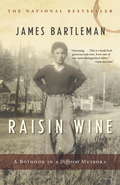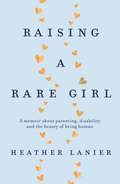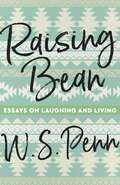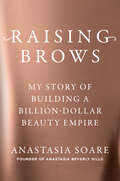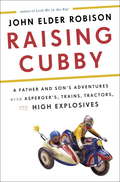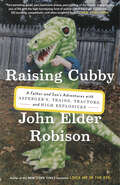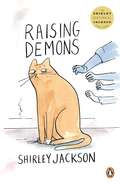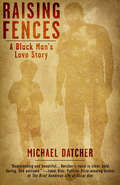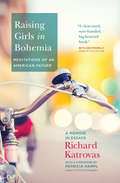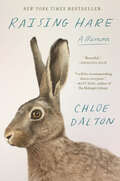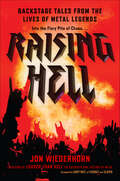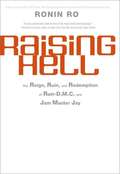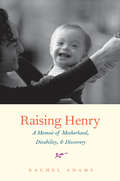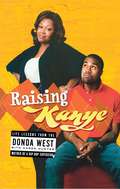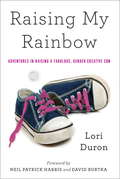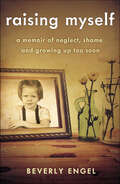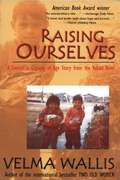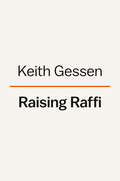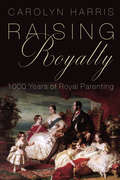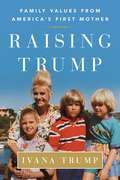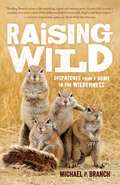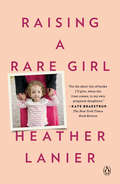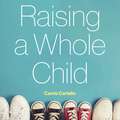- Table View
- List View
Raisin Wine: A Boyhood in a Different Muskoka
by James K. BartlemanA warm, at times hilarious, yet dark childhood memoir from a bestselling author.This memoir recalls the boyhood years of Ontario’s future lieutenant-governor, living in a dilapidated old house complete with outdoor toilet and coal oil-lamp lighting. Behind the outrageous stories, larger-than life-characters, and descriptions of the mores of a small village in the heart of Ontario’s cottage country are flashes of insight from the perspective of a child that recall the great classic Who has Seen the Wind by W.O. Mitchell.But why "a different Muskoka?" Because the boy was a half-breed kid. Visits to his mother’s reserve showed him that he was caught between two worlds. His mother’s fight with depression flowed from that dilemma. His father — the book’s main character — was a lovable, white, working class, happy-go-lucky guy who never had any money but who made the best home brew in the village — and his specialty was raisin wine.Like that raisin wine, this unusual book goes down easily and has a kick to it.
Raising A Rare Girl: A memoir about parenting, disability and the beauty of being human
by Heather LanierAward-winning writer Heather Lanier's memoir about raising a child with a rare syndrome, defying the tyranny of normal, and embracing parenthood as a spiritual practice that breaks us open in the best of ways.Like many women of her generation, writer Heather Lanier did everything by the book when she was expecting her first child. She ate organic foods, recited affirmations and drew up a birth plan for an unmedicated labour in the hopes that she could create a SuperBaby, an ultra-healthy human destined for a high-achieving future.But her daughter Fiona challenged all of Lanier's preconceptions. Born with an ultra-rare syndrome known as Wolf-Hirschhorn, Fiona received a daunting prognosis: she would experience significant developmental delays and might not reach her second birthday. Not only had Lanier failed to produce a SuperBaby, she now fiercely loved a child that the world would sometimes reject. The diagnosis obliterated Lanier's perfectionist tendencies, along with her most closely held beliefs about certainty, vulnerability and love.With tiny bits of mozzarella cheese, a walker rolled to library story time, a talking iPad app and a whole lot of rock and reggae, mother and daughter spend their days doing whatever it takes to give Fiona nourishment, movement, and language. They also confront society's attitudes toward disability and the often cruel assumptions made about Fiona's worth. Lanier realises the biggest question is not, Will my daughter walk or talk? but, How can I best love my girl, just as she is?Loving Fiona opens Lanier up to new understandings of what it means to be human, what it takes to be a mother, and above all, the aching joy and wonder that come from embracing the unique life of her rare girl.
Raising Bean: Essays on Laughing and Living (Made in Michigan Writers Series)
by W. S. PennOffered in the oral traditions of the Nez Perce, Native American writer W. S. Penn records the conversations he held with his granddaughter, lovingly referred to as "Bean," as he guided her toward adulthood while confronting society’s interest in possessions, fairness, and status. Drawing on his own family history and Native mythology, Penn charts a way through life where each endeavor is a journey—an opportunity to love, to learn, or to interact—rather than the means to a prize at the end. Divided into five parts, Penn addresses topics such as the power of words, race and identity, school, and how to be. In the essay "In the Nick of Names," Penn takes an amused look at the words we use for people and how their power, real or imagined, can alter our perception of an entire group. "To Have and On Hold" is an essay about wanting to assimilate into a group but at the risk of losing a good bit of yourself. "A Harvest Moon" is a humorous anecdote about a Native grandfather visiting his granddaughter’s classroom and the absurdities of being a professional Indian. "Not Nobody" uses "Be All that You Can Be Week" at Bean’s school to reveal the lessons and advantages of being a "nobody." In "From Paper to Person," Penn imagines the joy that may come to Bean when she spends time with her Paper People—three-foot-tall drawings, mounted on stiff cardboard—and as she grows into a young woman like her mom, able to say she is a person who is happy with what she has and not sorry for what she doesn’t. Comical and engaging, the essays in Raising Bean will appeal to readers of all backgrounds and interests, especially those with a curiosity in language, perception, humor, and the ways in which Native people guide their families and friends with stories.
Raising Brows: My Story of Building a Billion-Dollar Beauty Empire
by Anastasia SoareFrom the founder of Anastasia Beverly Hills - an immigrant who built a global cosmetics brand from nothing - an inspiring memoir about believing in yourself and chasing what brings you joyAn esthetician and single mother with no connections, Anastasia Soare risked her life escaping communist Romania to come to America. Raising Brows tells the remarkable story of how she built a billion-dollar beauty brand and went from watching Oprah&’s TV show to learn English, to shaping Oprah&’s eyebrows on the very same show years later.Anastasia disrupted the beauty industry by applying her art school training on the "golden ratio" of beauty to eyebrows. Helping women find harmony with their face, Anastasia put eyebrows on the map. She pioneered new makeup products and built a glittering roster of clients like Michelle Obama, Jennifer Lopez, Kim Kardashian, and Hailey Bieber. But beneath the glossy exterior, Anastasia&’s path wasn&’t easy.In this powerful memoir, she shares her extraordinary journey, putting her Romanian values of hard work, persistence, and optimism to the test in Los Angeles, ignoring the landlords and bank managers who laughed when she tried to open a salon focusing on brows. Anastasia&’s story serves as a powerful reminder that you can do anything you put your mind to so long as you are passionate and determined. As she says, "It's the love and effort we put into our pursuits and relationships that truly define our success."
Raising Cubby
by John Elder RobisonThe slyly funny, sweetly moving memoir of an unconventional dad's relationship with his equally offbeat son--complete with fast cars, tall tales, homemade explosives, and a whole lot of fun and trouble Misfit, truant, delinquent. John Robison was never a model child, and he wasn't a model dad either. Diagnosed with Asperger's syndrome at the age of forty, he approached fatherhood as a series of logic puzzles and practical jokes. When his son, Cubby, asked, "Where did I come from?" John said he'd bought him at the Kid Store and that the salesman had cheated him by promising Cubby would "do all chores." He read electrical engineering manuals to Cubby at bedtime. He told Cubby that wizards turned children into stone when they misbehaved. Still, John got the basics right. He made sure Cubby never drank diesel fuel at the automobile repair shop he owns. And he gave him a life of adventure: By the time Cubby was ten, he'd steered a Coast Guard cutter, driven a freight locomotive, and run an antique Rolls Royce into a fence. The one thing John couldn't figure out was what to do when school authorities decided that Cubby was dumb and stubborn--the very same thing he had been told as a child. Did Cubby have Asperger's too? The answer was unclear. One thing was clear, though: By the time he turned seventeen, Cubby had become a brilliant chemist--smart enough to make military-grade explosives and bring state and federal agents calling. Afterward, with Cubby facing up to sixty years in prison, both father and son were forced to take stock of their lives, finally coming to terms with being "on the spectrum" as both a challenge and a unique gift. By turns tender, suspenseful, and hilarious, this is more than just the story of raising Cubby. It's the story of a father and son who grow up together. Praise for John Robison's first book, Look Me In the Eye:"Lean, powerful in its descriptive accuracy and engaging in its understated humor...Emotionally gripping." --Chicago Tribune"A fantastic life story told with grace, humor, and a bracing lack of sentimentality." --Entertainment Weekly"Endearing...Robison is a natural storyteller." --Boston Globe
Raising Cubby: A Father and Son's Adventures with Asperger's, Trains, Tractors, and High Explosives
by John Elder RobisonThe slyly funny, sweetly moving memoir of an unconventional dad's relationship with his equally offbeat son--complete with fast cars, tall tales, homemade explosives, and a whole lot of fun and trouble John Robison was not your typical dad. Diagnosed with Asperger's syndrome at the age of forty, he approached fatherhood as a series of logic puzzles and practical jokes. Instead of a speech about the birds and the bees, he told his son, Cubby, that he'd bought him at the Kid Store--and that the salesman had cheated him by promising Cubby would "do all chores." While other parents played catch with their kids, John taught Cubby to drive the family's antique Rolls-Royce. Still, Cubby seemed to be turning out pretty well, at least until school authorities decided that he was dumb and stubborn--the very same thing John had been told as a child. Did Cubby have Asperger's too? The answer was unclear. One thing was clear, though: By the time he turned seventeen, Cubby had become a brilliant and curious chemist--smart enough to make military-grade explosives and bring federal agents calling. With Cubby facing a felony trial--and up to sixty years in prison--both father and son were forced to take stock of their lives, finally accepting that being "on the spectrum" is both a challenge and a unique gift.nd a bracing lack of sentimentality." --Entertainment Weekly"Endearing...Robison is a natural storyteller." --Boston Globe
Raising Demons
by Shirley JacksonIn the uproarious sequel to Life Among the Savages, the author of The Haunting of Hill House confronts the most vexing demons yet: her childrenIn the long out-of-print sequel to Life Among the Savages, Jackson's four children have grown from savages into full-fledged demons. After bursting the seams of their first house, Jackson's clan moves into a larger home. Of course, the chaos simply moves with them. A confrontation with the IRS, Little League, trumpet lessons, and enough clutter to bury her alive--Jackson spins them all into an indelible reminder that every bit as thrilling as a murderous family in a haunted house is a happy family in a new home.
Raising Fences: A Black Man's Love Story
by Michael DatcherThis New York Times–bestselling memoir about an African American man’s struggles and triumphs is “heartrending and beautiful” (Junot Diaz Pulitzer Prize–winning author of The Brief Wondrous Life of Oscar Wao). A Today Show Book Club selection, Raising Fences tells the story of a man whose youth was spent committing petty crimes, experimenting with sex, and developing a mortal fear of police. Like many young black men, Michael Datcher’s childhood was marked by the gaping hole left by an absent father. Out of that absence grew the desire to fulfill a dream that seemed almost a fantasy: to leave the streets behind, build a family, and become what he had wanted so badly—a good father. Moving past his self-destructive habits and taking responsibility for his mistakes wasn’t easy. Datcher’s journey nearly brought him to his breaking point—where he faced the threat of becoming what he feared most. “Datcher’s voice is clear, bold, daring, and welcome.” —Junot Diaz, Pulitzer Prize–winning author of The Brief Wondrous Life of Oscar Wao “Honest, brisk and ultimately very moving . . . A beautiful story of real-life redemption.” —Kirkus Reviews “Combines attitude, honesty and romance . . . A stunning tribute to perseverance, courage and the power of positive thinking.” —Publishers Weekly “Brutally honest, hauntingly poetic . . . Heartbreaking.” —Essence “Riveting.” —USA Today “Poignant . . . Complex.” —The Seattle Times “An inspiration to all who dare to dream of a better life.” —The Star-Ledger
Raising Girls in Bohemia
by Richard KatrovasA provocative collection of personal and political essays by an American writer, Raising Girls in Bohemia chronicles the life of a father raising three perfectly bilingual, culturally bifurcated, Czech-American daughters. While tracing what fatherhood has taught him about the world, Katrovas delves into a range of intricately related yet far-flung subjects including fine dining, sexual epithets, gender identity, racism, poetry, and education, tracing the contours of his ignorance about all things. Through the course of these fine essays, Katrovas unveils what it means to be an American and to be a man, and especially what it means to be a father of three daughters, born in Prague, in what we can only hope is the twilight of patriarchy.
Raising Hare: A Memoir
by Chloe DaltonA moving and fascinating meditation on freedom, trust, loss, and our relationship with the natural world, explored through the story of one woman’s unlikely friendship with a wild hare. <p> Imagine you could hold a baby hare and bottle-feed it. Imagine that it lived under your roof and lolloped around your bedroom at night, drumming on the duvet cover when it wanted your attention. Imagine that, over two years later, it still ran in from the fields when you called it and slept in your house for hours on end and gave birth to leverets in your study. For political advisor and speechwriter Chloe Dalton, who spent lockdown deep in the English countryside, far away from her usual busy London life, this became her unexpected reality. <p> In February 2021, Dalton stumbles upon a newborn hare—a leveret—that had been chased by a dog. Fearing for its life, she brings it home, only to discover how impossible it is to rear a wild hare, most of whom perish in captivity from either shock or starvation. Through trial and error, she learns to feed and care for the leveret with every intention of returning it to the wilderness. Instead, it becomes her constant companion, wandering the fields and woods at night and returning to Dalton’s house by day. Though Dalton feared that the hare would be preyed upon by foxes, stoats, feral cats, raptors, and even people, she never tried to restrict it to the house. Each time the hare leaves, Chloe knows she may never see it again. Yet she also understands that to confine it would be its own kind of death. <p> Raising Hare chronicles their journey together, while also taking a deep dive into the lives and nature of hares, and the way they have been viewed historically in art, literature, and folklore. We witness first-hand the joy at this extraordinary relationship between human and animal, which serves as a reminder that the best things, and most beautiful experiences, arise when we least expect them. “A beautiful book that makes you think profoundly about how we so often tune out the natural world around us. Chloe Dalton is a tender, curious, wise, mind-expanding guide, connecting readers with the wild we humans once knew so well. I will be recommending this to everyone.”—Matt Haig, author of The Midnight Library. <b>New York Times Bestseller</b>
Raising Hell: Backstage Tales from the Lives of Metal Legends
by Jon WiederhornFrom the author of the celebrated classic Louder Than Hell comes an oral history of the badass Heavy Metal lifestyle—the debauchery, demolition, and headbanging dedication—featuring metalhead musicians from Black Sabbath and Judas Priest to Twisted Sister and Quiet Riot to Disturbed, Megadeth, Throwdown and more. In his song “You Can’t Kill Rock and Roll” Ozzy Osbourne sings, “Rock and roll is my religion and my law.” This is the mantra of the metal legends who populate Raising Hell—artists from Black Sabbath, Judas Priest, Slipknot, Slayer, and Lamb of God to Twisted Sister, Quiet Riot, Disturbed, Megadeth, and many more! It’s also the guiding principle for underground voices like Misery Index, Gorgoroth, Municipal Waste, and Throwdown. Through the decades, the metal scene has been populated by colorful individuals who have thwarted convention and lived by their own rules. For many, vice has been virtue, and the opportunity to record albums and tour has been an invitation to push boundaries and blow the lid off a Pandora’s box of riotous experiences: thievery, vandalism, hedonism, the occult, stage mishaps, mosh pit atrocities, and general insanity. To the figures in this book, metal is a means of banding together to stick a big middle finger to a society that had already decided they didn’t belong. Whether they were oddballs who didn’t fit in or angry kids from troubled backgrounds, metal gave them a sense of identity. Drawing from 150-plus first-hand interviews with vocalists, guitarists, bassists, keyboardists, and drummers, music journalist Jon Wiederhorn offers this collection of wild shenanigans from metal’s heaviest and most iconic acts—the parties, the tours, the mosh pits, the rage, the joy, the sex, the drugs . . . the heavy metal life! Horns up!
Raising Hell: The Reign, Ruin, and Redemption of Run-D. M. C. and Jam Master Jay
by Ronin RoThe year is 1978. Saturday Night Fever is breaking box office records. All over America kids are racing home to watch Dance Fever, Michael Jackson is poised to become the next major pop star, and in Hollis, Queens, fourteen-year-old Darryl McDaniels--who will one day go by the name D.M.C.--busts his first rhyme: "Apple to the peach, cherry to the plum. Don't stop rocking till you all get some." Darryl's friend Joseph Simmons--now known as Reverend Run--thinks Darryl's rhyme is pretty good, and he becomes inspired. Soon the two join forces with a DJ--Jason "Jam Master Jay" Mizell--and form Run-D.M.C. Managed by Run's brother, Russell Simmons, the trio, donning leather suits, Adidas sneakers, and gold chains, become the defiant creators of the world's most celebrated and enduring hip-hop albums-and in the process, drag rap music from urban streets into the corporate boardroom, profoundly changing everything about popular culture and American race relations. Through candid, original interviews and exclusive details about the group's extraordinary rise to the top--and its mortal end brought on by the tragic murder in 2002 of Jam Master Jay--Raising Hell tells of Run-D.M.C.'s epic story, including the rivalries with jealous peers, their mentoring of such legendary artists as the Beastie Boys and Public Enemy, and the battles with producers, record executives, and one another. Ronin Ro delivers a meticulously researched, compellingly written, affecting behind-the-music tale of family, friendship, betrayal, murder, and the building of the culture and industry known as hip-hop.
Raising Henry
by Rachel AdamsRachel Adamss life had always gone according to plan. She had an adoring husband, a beautiful two-year-old son, a sunny Manhattan apartment, and a position as a tenured professor at Columbia University. Everything changed with the birth of her second child, Henry. Just minutes after he was born, doctors told her that Henry had Down syndrome, and she knew that her life would never be the same. In this honest, self-critical, and surprisingly funny book, Adams chronicles the first three years of Henrys life and her own transformative experience of unexpectedly becoming the mother of a disabled child. A highly personal story of one familys encounter with disability, "Raising Henry" is also an insightful exploration of todays knotty terrain of social prejudice, disability policy, genetics, prenatal testing, medical training, and inclusive education. Adams untangles the contradictions of living in a society that is more enlightened and supportive of people with disabilities than ever before, yet is racing to perfect prenatal tests to prevent children like Henry from being born. Her book is gripping, beautifully written, and nearly impossible to put down. Once read, her familys story is impossible to forget.
Raising Kanye: Life Lessons from the Mother of a Hip-hop Superstar
by Karen Hunter Donda West Kanye WestAs the mother of hip-hop superstar Kanye West, Donda West has watched her son grow from a brilliant baby boy with all the intimations of fame and fortune to one of the hottest rappers on the music scene. And she has every right to be proud: she raised her son with strong moral values, teaching him right from wrong and helping him become the man he is today. In Raising Kanye, Donda not only pays homage to her famous son but reflects on all the things she learned about being his mother along the way. Featuring never-before-seen photos and compelling personal anecdotes, Donda's powerful and inspiring memoir reveals everything from the difficulties she faced as a single mother in the African-American community to her later experiences as Kanye's manager as he rose to superstardom. Speaking frankly about her son's reputation as a "Mama's Boy," and his memorable public outbursts about gay rights and President George W. Bush, Donda supports her son without exception, and here she shares the invaluable wisdom she has taken away from each experience -- passion, tolerance, patience, and above all, always telling the truth. Ultimately, she not only expresses what her famously talented son has meant to her but what he has meant to music and an entire generation.
Raising My Rainbow: Adventures in Raising a Fabulous, Gender Creative Son
by Neil Patrick Harris Lori Duron David BurtkaRaising My Rainbow is Lori Duron’s frank, heartfelt, and brutally funny account of her and her family's adventures of distress and happiness raising a gender-creative son. Whereas her older son, Chase, is a Lego-loving, sports-playing boy's boy, her younger son, C.J., would much rather twirl around in a pink sparkly tutu, with a Disney Princess in each hand while singing Lady Gaga's "Paparazzi."<P><P> C.J. is gender variant or gender nonconforming, whichever you prefer. Whatever the term, Lori has a boy who likes girl stuff—really likes girl stuff. He floats on the gender-variation spectrum from super-macho-masculine on the left all the way to super-girly-feminine on the right. He's not all pink and not all blue. He's a muddled mess or a rainbow creation. Lori and her family choose to see the rainbow.<P> Written in Lori's uniquely witty and warm voice and launched by her incredibly popular blog of the same name, Raising My Rainbow is the unforgettable story of her wonderful family as they navigate the often challenging but never dull privilege of raising a slightly effeminate, possibly gay, totally fabulous son.
Raising Myself: A Memoir of Neglect, Shame, and Growing Up Too Soon
by Beverly EngelNo one could have imagined how as a child Beverly Engel could have managed to become who she is today—an internationally known expert on abuse recovery and the best-selling author of twenty-two self-help books. This is the raw, candid story of how she made her way in the world in spite of her mother’s neglect, unreasonable expectations and constant criticism; in spite of being sexually abused, first at four years old and then at nine; and in spite of being raped at twelve. Raising Myself takes readers on a remarkable journey, showing us how Engel, who was basically on her own from the age of four, learned how to cope with a neglectful, narcissistic mother while being surrounded by a cast of characters that included eccentrics and misfits, a religious fanatic, child molesters, rapists, and hoodlums. It is a soul-searching memoir about how she came dangerously close to the edge of becoming a child molester, a criminal, and a suicide, and how she battled her inner demons and struggled to keep her heart open and to “reinvent” herself so she could follow her dream of making something of herself. Powerfully inspiring and unflinchingly honest, Raising Myself is a story of remarkable resilience and insight.
Raising Ollie: How My Nonbinary Art-Nerd Kid Changed (Nearly) Everything I Know
by Tom RademacherThe account of one radically new school year for a Teacher of the Year and for his nonbinary, art-obsessed, brilliant child Seven-year-old Ollie was researching local advanced school programs—because every second grader does that, right? Ollie, who used to hate weekends because they meant no school, was crying on the way to school almost every day. Sure, there were the slings and arrows of bullies and bad teachers, but, maybe worse, Ollie, a funny, anxious, smart kid with a thing for choir and an eye for graphic art, was gravely underchallenged and also struggling with identity and how to live totally as themselves. Ollie begged to switch to a new school with &“kids like me,&” where they wouldn&’t feel so alone, or so bored, and so they made the change. Raising Ollie is dad Tom Rademacher&’s story (really, many stories) of that eventful and sometimes painful school year, parenting Ollie and relearning every day what it means to be a father and teacher. As Ollie—who is nonbinary and uses they/them pronouns, and prefers art to athletics, vegetables to cake, and animals to most humans—flourishes in their new school, Rademacher is making an eye-opening adjustment to a new school of his own, one that&’s whiter and more suburban than anywhere he has previously taught, with a history of racial tension that he tries to address and navigate. While Ollie is learning to code, 3D model, animate, speak Japanese, and finally feel comfortable at school, Rademacher increasingly sees how his own educational struggles, anxieties, and childhood upbringing are reflected in his teaching, writing, and parenting, as well as in Ollie&’s experience. And with this story of one anything-but-academic year of inquiry and wonder, doubt and revelation, he shows us how raising a kid changes everything—and how much raising a kid like Ollie can teach us about who we are and what we&’re doing in the world.
Raising Ourselves: A Gwich'in Coming Of Age Story From The Yukon River
by Velma WallisBorn in 1960, the sixth of thirteen children, Velma Wallis comes of age in a two-room log cabin in remote Fort Yukon, Alaska. Life is defined by the business of living off the land. Chopping wood. Hauling water from the river. Hunting moose. Catching salmon. Traping fur. Taking care of the dogs. For a thousand years, the Gwich'in clan had followed migratory animals across the north. But two generations before, the people had settled where the Porcupine River flows into the Yukon. Now, the Wallis family has a post office box and an account at the general store, and Velma listens to Wolf Man Jack on armed forces radio. The author discovers that her people have surrendered their language, traditional values, and religion to white teachers, traders, and missionaries. Flu epidemics have claimed many loved ones. Village elders seem like strangers from another land, and in a way they are. There is much drinking when the monthly government checks come, and that is when the pain comes out of hiding. RAISING OURSELVES is a gritty, sobering, yet irresistible story filled with laughter even as generations of Gwich'in grief seeps from past to present. But hope pushes back hopelessness, and a new strength and wisdom emerge.
Raising Raffi: The First Five Years
by Keith Gessen&“A wise, mild and enviably lucid book about a chaotic scene.&” —Dwight Garner, The New York Times &“Raising Raffi is tender and generous.&” —New York magazine NAMED A MOST ANTICIPATED BOOK OF 2022 BY LIT HUB & THE MILLIONS An unsparing, loving account of fatherhood and the surprising, magical, and maddening first five years of a son&’s life&“I was not prepared to be a father—this much I knew.&” Keith Gessen was nearing forty and hadn&’t given much thought to the idea of being a father. He assumed he would have kids, but couldn&’t imagine what it would be like to be a parent, or what kind of parent he would be. Then, one Tuesday night in early June, the distant idea of fatherhood came careening into view: Raffi was born, a child as real and complex and demanding of his parents&’ energy as he was singularly magical. Fatherhood is another country: a place where the old concerns are swept away, where the ordering of time is reconstituted, where days unfold according to a child&’s needs. Whatever rulebooks once existed for this sort of thing seem irrelevant or outdated. Overnight, Gessen&’s perception of his neighborhood changes: suddenly there are flocks of other parents and babies, playgrounds, and schools that span entire blocks. Raffi is enchanting, as well as terrifying, and like all parents, Gessen wants to do what is best for his child. But he has no idea what that is. Written over the first five years of Raffi&’s life, Raising Raffi examines the profound, overwhelming, often maddening experience of being a dad. Gessen traces how the practical decisions one must make each day intersect with some of the weightiest concerns of our age: What does it mean to choose a school in a segregated city? How do you instill in your child a sense of his heritage without passing on that history&’s darker sides? Is parental anger normal, possibly useful, or is it inevitably authoritarian and destructive? How do you get your kid to play sports? And what do you do, in a pandemic, when the whole world seems to fall apart? By turns hilarious and poignant, Raising Raffi is a story of what it means to invent the world anew.
Raising Royalty: 1000 Years of Royal Parenting
by Carolyn HarrisHow royal parents dealt with raising their children over the past thousand years, from keeping Vikings at bay to fending off paparazzi. William and Kate, the Duke and Duchess of Cambridge, are setting trends for millions of parents around the world. The upbringing of their children, Prince George and Princess Charlotte, is the focus of intense popular scrutiny. Royalty have always raised their children in the public eye and attracted praise or criticism according to parenting standards of their day. Royal parents have faced unique challenges and held unique privileges. In medieval times, raising an heir often meant raising a rival, and monarchs sometimes faced their grown children on the battlefield. Conversely, kings and queens who lost their thrones in wars or popular revolutions often found solace in time spent with their children. In modern times, royal duties and overseas tours have often separated young princes and princesses from their parents, a circumstance that is slowly changing with the current generation of royalty.
Raising Trump
by Ivana TrumpIn Raising Trump, Ivana Trump reflects on her extraordinary life and the raising of her three children—Donald Jr., Eric, and Ivanka—and recounts the lessons she taught her children as they were growing up.As her former husband takes his place as the 45th President of the United States, his children have also been thrust into the media spotlight—but it is Ivana who raised them and proudly instilled in them what she believes to be the most important life lessons: loyalty, honesty, integrity, and drive. Raising Trump is a non-partisan, non-political book about motherhood, strength, and resilience. Though Ivana writes about her childhood in communist Czechoslovakia, her escape from the regime and relocation to New York, her whirlwind romance, and her great success as a businesswoman, the focus of the book is devoted to Ivana&’s raising of her children. Donald Trump Jr., Eric Trump, and Ivanka Trump will all contribute their own memories to the book. &“Every day, people ask me how I raised such great kids. They are truly amazed when I tell them that there was no magic to their upbringing. I was a tough and loving mother who taught them the value of a dollar, not to lie, cheat, or steal, respect for others, and other life lessons that I&’ll share now in Raising Trump, along with unfiltered personal stories about Don, Eric, and Ivanka from their early childhood to becoming the &‘first sons and daughter.&’&” —Ivana Trump
Raising Wild
by Michael P. Branch"Combining natural history, humor, and personal narrative, Raising Wild is an intimate exploration of Nevada's Great Basin Desert, the wild and extreme land of high desert caliche and juniper, of pronghorn antelope and mountain lions, where wildfires and snowstorms threaten in equal measure. Within this remote, high desert landscape sits the home of Michael Branch, where he, his wife, and their two curious little girls brazenly live among the packrats and ground squirrels, rattlesnakes and scorpions. In Branch's hands, this exceedingly barren and stark landscape becomes a place teeming with energy, surprise, and an endless web of connections that ultimately includes his family and home. It is in this desert setting where, in building a ladder to the stars, one can find a connection to the past and to the heavens; where his children's first garden becomes not the quaint blossoming of seed to flower and fruit but a smoke bomb-drenched exhibit of futility in the face of the inhospitable desert environment; where the surprise of fire acts as a reminder all too real of the unknowable that awaits us and for which we can never fully prepare. In this exhilarating, lyrical, and humorous exploration of natural history, Branch reveals a desert wilderness in which our ideas about nature and ourselves are challenged and transformed. "
Raising Your Kids Without Losing Your Cool
by Shantelle BissonHarried mother of three Shantelle Bisson guides you through raising a family, all while keeping your cool! Let’s face it — raising children can take a wrecking ball to your ambitions, your finances, your relationships, even your health. But, as mother of three Shantelle Bisson will tell you, it doesn’t have to be that way. In Raising Your Kids Without Losing Your Cool, Shantelle sets out how to get ready for baby‘s arrival, helps you through the big push, lays it all out on breastfeeding, and makes sure you don‘t forget to KEEP HAVING SEX. Plus, she‘ll help you navigate the perils of helicopter parenting, children on social media, and even gender-reveal parties, and answer the burning question: Is that really cool?
Raising a Rare Girl: A Memoir
by Heather LanierAward-winning writer Heather Lanier's memoir about raising a child with a rare syndrome, defying the tyranny of normal, and embracing parenthood as a spiritual practice that breaks us open in the best of ways.Like many women of her generation, Heather Lanier did everything by the book when she was expecting her first child. She ate organic foods, recited affirmations, and drew up a birth plan for an unmedicated labor in the hopes that she could create a SuperBaby, an ultra-healthy human destined for a high-achieving future. But her daughter Fiona challenged all of Lanier's preconceptions. Born with an ultra-rare syndrome known as Wolf-Hirschhorn, Fiona received a daunting prognosis: she would experience significant developmental delays and might not reach her second birthday. Not only had Lanier failed to produce a SuperBaby, she now fiercely loved a child that the world would sometimes reject. The diagnosis obliterated Lanier's perfectionist tendencies, along with her most closely held beliefs about certainty, vulnerability, God, and love. With tiny bits of mozzarella cheese, a walker rolled to library story time, a talking iPad app, and a whole lot of pop and reggae, mother and daughter spend their days doing whatever it takes to give Fiona nourishment, movement, and language. They also confront society's attitudes toward disability and the often cruel assumptions made about Fiona's worth. Lanier realizes the biggest question is not, Will my daughter walk or talk? but, How can I best love my girl, just as she is? Loving Fiona opens Lanier up to new understandings of what it means to be human, what it takes to be a mother, and above all, the aching joy and wonder that come from embracing the unique life of her rare girl.
Raising a Whole Child: A family guide to supporting autistic children into adulthood
by Carrie CarielloYou're the parent of an autistic child...except they're not a child anymore. So, now what?As autistic children grow into teenagers, you will experience new challenges, both as a parent and as a family. Supporting the leap into adulthood can seem daunting, but here Carrie Cariello takes you through her journey with her son Jack, shining a light on how to help your young person prepare for different life stages and grow in independence. Carrie's own experiences form the basis of her deeply empathetic advice - in this warm, astute and thoughtful book she offers a guiding and steadying hand so you can move through periods of change with increased confidence and calm.
